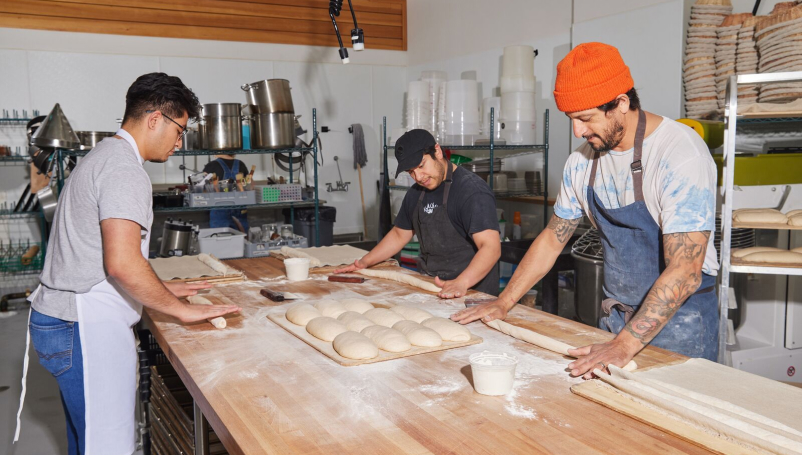Who needs Nevada food manager certification?
Nearly every business in Nevada that serves food needs a certified food manager on the premises during all hours of operation. This is a requirement set out by the Nevada Administrative Code. For sole proprietors, this means getting the food safety manager certification yourself to comply with health regulations.
However, there are a few exceptions. Some low-risk food businesses are exempt from this food manager requirement:
- Most convenience stores
- Establishments that heat commercially processed foods solely for hot holding
- Places that deal in prepackaged foods that don’t require time or temperature controls
How to get Nevada food safety manager certification
To become a certified food safety manager in Nevada, your employee must complete a training program accredited by the American National Standards Institute (ANSI) and pass an exam.
Certified food safety manager courses and examinations cover various topics related to food handling, including:
- General food safety practices
- Personal hygiene and handwashing
- Preventing contamination and cross-contamination
- Time and temperature requirements
- Cleaning and sanitation
One recognized course is the ServSafe manager certification offered by the Nevada Restaurant Association. There are also other ANSI-accredited programs available. You can find a list of approved food manager safety courses and exam providers on the Nevada Division of Public and Behavioral Health website.
In Clark County, after earning the certificate, food safety managers must also obtain an official SNHD Certified Food Safety Manager Card.
The Nevada food manager certification process starts with a minimum of eight hours of instructional training. Once the course is completed, participants must pass an official ANSI food manager exam, proctored by an approved instructor.
After passing the exam, restaurant workers become certified food managers. Certificates may be issued immediately or sent by mail.
Once you’ve completed an approved training course and passed the exam, you’ll be awarded an official food manager certificate. As a restaurant owner, you must display the certificate in the food establishment or be readily accessible to health inspectors upon request.
If a food manager’s certification is lost or damaged, they may contact the examination provider for a replacement.
Nevada food manager certificates are valid for five years. When it’s time to renew, employees must complete a recertification course and pass the exam again. After successfully renewing, make sure to display the updated food manager license to ensure ongoing compliance.
How much does Nevada food manager certification cost?
Nevada offers a range of options for obtaining your food manager certification through various ANSI-accredited providers. Courses may take place online or in person.
The total cost for the certification, which includes the course, materials and the proctored exam, typically ranges from $100 to $200. If you’re a member of the Nevada Restaurant Association, you’re in luck — members are eligible for a discount when booking a ServSafe manager course through the association.
Restaurant managers in Clark County will pay an additional $20 fee to receive their official SNHD Certified Food Safety Manager Card.
It’s important to note that restaurant owners are not required to cover the cost of these certifications for their employees. Since this certification belongs to the employee, they can take it to another food establishment if they change jobs.
Insurance for Nevada restaurants, caterers, cafes and food service businesses
Ensuring your Nevada restaurant or food establishment is well-protected against everyday risks is crucial. Here’s a breakdown of the key Nevada business insurance options many restaurant owners opt for:
General liability insurance
General liability insurance is fundamental for financial protection against common accidents that result in property damage or injury to others. For restaurants, there’s also food service general liability insurance, which includes coverage for incidents like foodborne illnesses, protecting your business if a customer falls ill due to improperly prepared or contaminated food.
Workers’ compensation insurance
Nevada requires most private employers to carry workers’ compensation insurance. It helps cover lost wages, medical expenses and other related costs if an employee gets sick or injured on the job.
Commercial property insurance
Commercial property insurance protects the physical aspects of your business — your building, furniture, equipment and inventory. This insurance is your safety net for repairs or replacements after a covered event, such as a fire or water damage from a burst pipe.
Commercial auto insurance
If you or an employee is in an accident while driving a work vehicle, commercial auto insurance can help provide important coverage for medical expenses and property damage.
Remember that all registered vehicles in Nevada must have minimum auto insurance coverage. Your policy must include bodily injury coverage of $25,000 per person ($50,000 per accident) and $20,000 for property damage.
Nevada food manager certification reciprocity
In Nevada, food manager certificates from approved programs are recognized across the state. You might be eligible for reciprocity in Nevada if you’re already a certified food manager from another state. This is possible if your certification comes from an ANSI-accredited organization and aligns with Nevada’s training standards.
Keep in mind, though, that for Clark County, there’s an additional requirement. All food handlers here need to get a certified food safety manager card. The SNHD recognizes only those certifications issued within Clark County.
Food manager certification vs. food handlers card
While food managers have specific certifications, other restaurant employees handling food may need a food safety certificate. Servers, chefs, kitchen staff, bussers, bartenders, hosts and on-site event coordinators are all examples of food handlers. Even though food handler cards aren’t mandatory statewide, certain areas of Nevada can require them.
For example, in Clark County, under the Southern Nevada Health District (SNHD), all food handlers must have a Food Handler Safety Training Card. If your restaurant operates in Clark County, your employees must meet this requirement, including any staff who handle, store, transport, prepare, serve or sell food.
Overseeing these certified food handlers is a “person in charge” with a Southern Nevada food safety manager certification. Although food handler cards are not mandatory in the rest of the state, the Department of Health and Human Services Nevada requires food establishments to have a certified food manager on the premises.
Certified food manager responsibilities include:
- Overseeing food preparation and handling
- Developing policies and procedures to prevent foodborne illness
- Identifying day-to-day operational health hazards
- Training and supervising food handlers to protect consumer health
- Conducting reviews to ensure food safety
Food managers and food handlers can help protect your business. Employing staff with the appropriate training in food preparation and handling techniques can significantly reduce the risk of foodborne illness.
How NEXT helps support Nevada restaurants, cafes, caterers and food service
NEXT specializes in Nevada restaurant insurance policies that fit the needs of small restaurant and food service businesses and self-employed business owners.
In just about 10 minutes, you can get a quote, review coverage options, select your policies and download a certificate of insurance.
Our expert team of licensed insurance advisors is always ready to guide you through any questions you might have along the way.
Start a free quote with NEXT.






